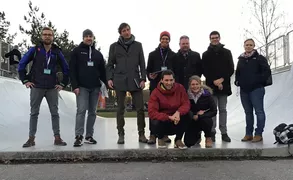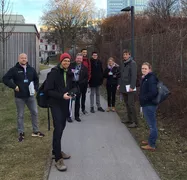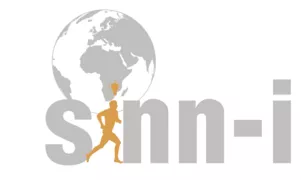Promoting the joy of movement! This is the aim of two ongoing projects in which the Associate Professorship of Didactics in Sport and Health is involved under the direction of Prof. Dr. Filip Mess. Both “Active City Innovation” and “Go, WannaGo!” are being supported by the Federal Ministry of Education and Research (BMBF) within the framework of the funding guideline “Internationalisation of Leading-Edge Clusters, Future Projects and Comparable Networks” with a sum of approximately one million euros each. The Faculty of Sports and Health Sciences (SG) will receive a share of 225,000 Euros for “Active City Innovation” and 120,000 Euros for “Go, WannaGo!”. The projects will run for three years.
Both projects are part of the international Sport Innovation Network (SINN-i), which aims to promote innovations in the fields of exercise, health and the joy of life and physical activity worldwide. The network consists of more than 60 partners in a total of five countries - Germany, Spain, England, Japan and South Africa - and was initiated by Innovationsmanufaktur GmbH.
“Working with SINN-i is extremely appealing to us,” says Prof. Mess. “On the one hand, we have a national network within Germany, enabling us to collaborate with key actors in the scientific community and the private sector. On the other hand, thanks to internationalisation, we can also work together with partners from other countries and exchange best-practice examples with them in order to learn from one another”.
The participating institutions gathered for meetings to discuss both sub-projects in Munich at the end of February. The “Active City Innovation” consortium meeting was held at the Uptown Campus on the Georg-Brauchle-Ring and organised by Christoph Mall, a research assistant at the Associate Professorship of Didactics in Sport and Health. The programme included the joint development of future steps and discussions about the course of events to date as well as possible suggestions for improvement.
“The focus of the two meetings was primarily on progress reporting and current challenges,” explains Mall. “Two sub-projects are already underway in Munich within the scope of 'Active City Innovation', which we were able to introduce to participants during on-site visits.”
“Active City Innovation” focuses on how cities can become active environments for health and exercise. The overall objective is the development, implementation and evaluation of a total of twelve experimental scenarios aimed at promoting physical activity in the five partner countries. Two of these scenarios are under development in Munich and are currently being implemented in pilot projects.
“kreuz & quer” (crisscross) is an interactive walking and running game organised in cooperation with the city of Munich. The game was conceived by mobility experts from the regional administration department and is designed to motivate children and young people to spend time outdoors and explore their district on foot, by bicycle or with a scooter. Boxes are hung up at various locations for the modern digital scavenger hunt. The aim is to collect as many points and kilometres as possible whilst holding a chip card in your hand. “Around 2,500 children and adults took part during the first round of the game in Moosach,” reports Christoph Mall. “A total of 72,000 kilometres were collected in the process.” Two to three rounds of this kind are to be held every year. However, the current project phase in Domagk park and the Schwabing city park had to be paused due to the corona virus.
The second “Experimentation Scenario” in Munich is being carried out in cooperation with “outdooractive”, a touring portal for outdoor athletes and the Munich University of Applied Sciences. Here, locals create city tours and exploratory tours for tourists or students from abroad, for example.
The second sub-project, “Go, WannaGo!” aims to identify motivators for physical activity and develop a system that makes people more active at work and in their private lives. “There are many people who potentially have the motivation to exercise, but are discouraged from doing so for various reasons,” says Christoph Mall. “Therefore, professional environments should be integrated to make it easier for people to become physically active.” To achieve this, elements from the fields of gamification and music, among others, will be used and examined in various experimental contexts. In this context, “gamification” means transferring elements from computer games to other fields in order to increase the motivation to engage in physical activity.
For Prof. Mess, the main goal of the overall project is “on the one hand, to motivate more people to exercise and, at the same time, to offer them more opportunities to move in their own environments.”
“In both sub-projects, as the TU Munich, we are primarily responsible for the scientific contribution with regard to the subjects of motivation and movement,” summarises Christoph Mall. “We also act as project coordinators for 'Active City Innovation' and are responsible for the overall evaluation.”
To the homepage of the Associate Professorship of Didactics in Sport and Health
Contact:
Prof. Dr. Filip Mess
Associate Professorship of Didactics in Sport and Health
Georg-Brauchle-Ring 60/62
80992 München
phone: 089 289 24521
e-mail: Filip.Mess(at)tum.de
Christoph Mall
Associate Professorship of Didactics in Sport and Health
Georg-Brauchle-Ring 60/62
80992 München
phone: 089 289 24970
e-mail: Christoph.Mall(at)tum.de
Text: Romy Schwaiger
Photos: SINN-i/Associate Professorship of Didactics in Sport and Health


